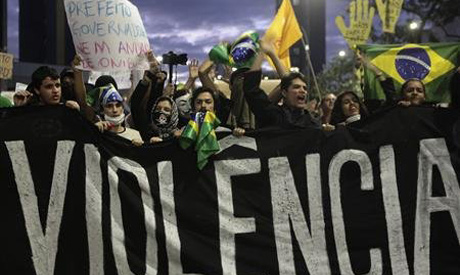
Demonstrators shout anti-government slogans behind a banner, which reads as 'violence', during one of many protests around Brazil's major cities in Sao Paulo 17 June, 2013 (Photo: Reuters)
Demonstrators blocked a major highway and other roads in Sao Paulo on Wednesday, crippling transportation in Brazil's largest city and financial hub, in an ongoing wave of protests against poor public services, inflation and police violence.
The protests, the biggest in Brazil in over two decades, followed overnight demonstrations that led to sporadic looting and vandalism. Police in Sao Paulo, the focal point of the nationwide demonstrations, arrested more than 63 people after protesters tried to storm the city hall, torched a police facility and broke windows.
Sao Paulo Mayor Fernando Haddad was considering on Wednesday a possible reduction in bus fares, following cuts by officials in a handful of other state capitals. The national protests were sparked last week by fare hikes, which came as Brazil struggles with annual inflation of 6.5 percent, unleashing a swelling tide of complaints that caught authorities off guard.
President Dilma Rousseff, who has acknowledged the legitimacy of the protesters' demands, dispatched federal troops to five Brazilian cities to help maintain order around the Confederations Cup, which began earlier this month. The international soccer tournament is seen as a warmup to the 2014 World Cup, which Brazil is hosting.
Rousseff's action, part of the contingency plan for the tournament, is similar to previous deployments of federal troops when crime, violence or other unrest disrupted annual Carnival celebration and other big events.
Brazil is due to play Mexico on Wednesday in the northeastern city of Fortaleza, one of dozens of cities where protests occurred this week. Local media reported that demonstrators planned to march to the stadium before the start of the game.
Federal troops also will be deployed in Rio de Janeiro, Salvador, Belo Horizonte and the national capital, Brasilia.
It remains unclear whether fare reductions will be enough to slow the demonstrations or whether organizers, a loose collection of young activists who are organizing through social media, will continue calling for protests.
Better public services
Rousseff, a former leftist guerrilla who was imprisoned and tortured by military dictators in her youth, on Tuesday said Brazilians, many of whom recently entered the country's growing consumer class before a recent slowdown curbed a near decade-long economic boom, deserved better public services.
Neither her words nor efforts by state and local officials have done much to stop the unrest, in part because of the diffuse nature of the protesters and the wide array of their demands.
"It's difficult to get ahead of the movement because there isn't a clear image of who they are or what exactly they will do," said David Fleischer, a political scientist at the University of Brasilia. "It's hard to have a discourse with someone you don't know."
Although many Brazilians support the issues raised by the protesters, but are concerned about the vandalism and scattered violence that has accompanied some of the demonstrations.
In central Sao Paulo early on Wednesday, broken glass and other debris was scattered atop colonial cobblestones, and graffiti was scrawled on the front of the city hall. "The people have awoken," read one of the messages, echoing one of many chants that protesters have been yelling as they march throughout the country.
"People are going to pay for this out of their pockets," said Manuel Carlos, a 42-year-old logistics manager nearby. "I am in favor of the movement, but the stuff we are seeing here is absurd."
Short link: